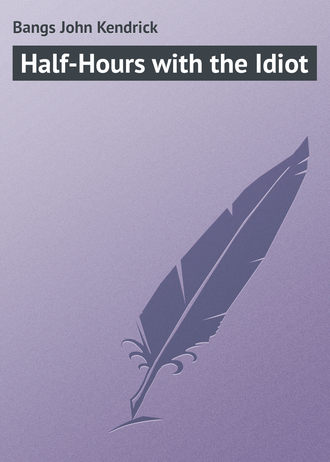 полная версия
полная версияHalf-Hours with the Idiot
"Yes," said Mr. Brief. "I read all that, and it was almost as unreal as a page out of the Arabian Nights."
"Wasn't it!" said the Idiot. "And yet how simple! Well, that's my scheme in a nutshell, only I am going to do the thing as a pure matter of business, and not merely to show the purity of my affection for any Pythian dependent.
"To show just how the plan will work under my supervision let us take your case first, Mr. Poet. Here you are this morning with your board bill already passed to its third reading, with Mrs. Pedagog tacking amendments on to the end of it with every passing day. Unfortunately for you in your emergent hour, the editors either view your manuscripts with suspicion or, what is more likely, refuse to look at them at all. They care nothing for your aspirations or your inspirations.
"Your immediate prospect holds nothing in sight save the weary parcel postman, with his bent form, delivering daily at your door eleven-pound packages of unappreciated sonnets. You do not dare think on the morrow, what ye shall eat, and wherewithal shall ye be clothed, because no man liveth who can purchase the necessities of life with rejection slips – those checks on the Banks of Ambition, payable in the editors' regrets."
"By George," blurted the Poet feelingly, "you're dead right about that, old man. If editors' regrets were legal tender, I could pay off the national debt."
"Precisely," said the Idiot. "And it is just here, my dear friend, that the U. S. Telephonic Aid Society rushes to your assistance. Your case is brought to the society's attention, and I, as President, Secretary, Treasurer, and General Manager of the institution, look into the matter at once.
"I find your work meritorious. No editor has ever rejected it because it lacked literary merit. He even goes so far as to print a statement of that fact upon the slip he sends back with it on its homeward journey. Like most other poets you need a little food once in awhile. A roof to cover your head is essential to your health, and under the existing laws of society you simply must wear clothes when you appear in public, and it becomes the Society's worthy job to aid you in getting all these things.
"So we close a contract providing that for ten dollars down and fifteen per cent. of the gross future receipts, I, or the Society, agree to secure the publication of your sonnets, rondeaux, limericks, and triolets in the Hyperion Magazine."
"That would be bully if you could only pull it off," said the Poet, falling naturally into the terminology of Milton. "But I don't just see how you're going to turn the trick."
"On the regular 'Damon and Pythias' principle, as set forth in the newspapers," said the Idiot. "Immediately the contract between us is signed, I rush to the nearest pay station and ring up the editor of the Hyperion Magazine, and when I get him on the line we converse as follows:
"Me – Is this the editor of the Hyperion Magazine?
"Editor – Ubetcha. Who are you?
"Me – I'm President Wilson, down at the White House.
"Editor – Glad to hear from you, Mr. President. Got any more of that new Freedom stuff on hand? We are thinking of running a Department of Humor in the Hyperion, and with a little editing I think we could use a couple of carloads of it.
"Me – Why, yes, Mr. Bluepencil. I think I have a bale or two of remnants in cold storage down at Trenton. But really that isn't what I am after this morning. I wanted to say to you officially, but confidentially, of course, that my Ambassador to Great Britain has just cabled his resignation to the State Department. What with a little breakfast he gave last week to the President of France and his tips at his own presentation to the King, he has already spent four years' salary, and he does not feel that he can afford to stay over there much after the first of September.
"Editor – I'm on. I getcha.
"Me – Now, of course, I've got to fill his place right away, and it struck me that you were just the man for the job. In the first place you are tolerably familiar with the language they speak in and about the Court of St. James's. I am told by mutual friends that you eat peas with a fork, can use a knife without cutting your lip, and have an intuitive apprehension of the subtle distinctions between a finger-bowl and a sauterne glass. It has also been brought to my attention that your advertising pages have for years been consistent advocates, in season and out, of the use of grape juice as a refreshing beverage for nervous Ambassadors.
"Editor – That's right, Mr. President.
"Me – Well, of course, all of this makes you unquestionably persona grata to us, and I think it should make you a novel and interesting feature of diplomatic life along Piccadilly.
"Editor – It sounds good to me, Mr. President.
"Me – Now to come to the difficulties in our way – and that is what I have rung you up to talk about. There seems to be but one serious objection to your appointment, Mr. Bluepencil. At a Cabinet meeting called yesterday to discuss the matter, Mr. McAdoo expressed the fear that if you go away for four years the quality of the poetry in the Hyperion Magazine will fall off. In this contention, Mr. McAdoo was supported by the Secretary of Agriculture, whose name escapes me at this moment, with the Postmaster General and the Secretary of War on the fence. Mr. Daniels was not present, having gone West to launch a battleship at Omaha. But in any event there is where the matter rests at this moment.
"For my own part, however, after giving the matter prayerful consideration, I think I can see a way out. The whole Cabinet is very much interested in the poems of Willie Wimpleton Spondy, the boy Watson. McAdoo is constantly quoting from him. The Postmaster General has even gone so far as to advocate the extension of the franking privilege to him, and as for myself, I have made it a practice for the last five years to begin every day by reciting one of his limericks before my assembled family.
"Editor – I never heard of the boob.
"Me – Well, you hear of him now, and the whole thing comes down to this: Mr. Spondy will call at your office with a couple of bales of his stuff at ten o'clock to-morrow morning, and you might have something besides a pink rejection slip dripping with regrets ready for him. I don't know what his rates are, but his stuff runs about ninety pounds to the bale, and what that comes to at fifty per you can figure out for yourself.
"Editor – How does Champ Clark stand on this thing?
"Me – He and Tommie Marshall are with us to the last tintinnabulation of the gong.
"Editor – Then I am to understand just what, Mr. President?
"Me – That you don't go to England on our account until we are absolutely assured beyond peradvanture that there will be no deterioration in the quality of Hyperion poetry during your absence.
"Editor – All right. Send the guy around this afternoon. He can send the bale by slow freight. We always pay in advance anyhow."
The Idiot paused to take breath.
"Then what?" asked the Poet dubiously.
"You go around and get what's coming to you," said the Idiot. "Or perhaps it would be better to send a messenger boy for it. The more impersonal we make this business the better."
"I see," said the Poet dejectedly. "But even at that, Mr. Idiot, when the Hyperion man doesn't get the Ambassadorship, won't he sue me to recover?"
"Oh, well," said the Idiot wearily, "you've got to assume some of the burdens of the business yourself. We can't do it all, you know. But suppose they do sue you? You never heard of a magazine recovering anything from a poet, did you? You'd get a heap of free advertising out of such a lawsuit, and if you were canny enough to put out a book of your verses while the newspapers were full of it, they'd go off like hot cakes, and you could retire with a cool million."
"And where do I come in?" asked the Doctor. "Don't I get any of these plums of prosperity your Telephonic Aid Society is to place within the reach of all?"
"On payment of the fee of ten dollars, and signing the regular contract," said the Idiot. "I'll do my best for you. In your case I should impersonate our good old friend Andrew Rockernegie. Acting in that capacity I would ring up Mr. John D. Reddymun, and you'd hear something like this:
"Me – Hello, Reddy – is this you?
"Reddymun – Yes. Who's this?
"Me – This is Uncle Andy. How's the leg this morning?
"Reddymun – Oh, so so.
"Me – Everybody pulling it, I suppose?
"Reddymun – About the same as usual. It's curious, Andrew, how many people are attached to my limb, and how few are attached to me.
"Me – Yes, it's a cold and cruel world, John. But I'm through. I've found the way out. They'll never pull my leg again.
"Reddymun – By George, old man, I wish I could say as much.
"Me – Well, you can if you'll only do what I did.
"Reddymun – What's that?
"Me – Had it cut off.
"Reddymun – No!
"Me – Yep!
"Reddymun – When?
"Me – Just now.
"Reddymun – Hurt?
"Me – Never knew what was happening.
"Reddymun – Who did it?
"Me – Old Doctor Squills. He charged me ten thousand dollars for the job, but I figure it out that it has saved me six hundred and thirty three million dollars.
"Reddymun – Send him around, will you?
"Me – Ubetcha!"
"And then?" said the Doctor.
"And then?" echoed the Idiot. "Well, if you don't know what you would do if you were offered ten thousand dollars to cut a man's leg off I can't teach you, but I have one piece of advice to give you. When you get the order don't go around there with a case full of teaspoons and soup-ladles, when all you need is a good sharp carving knife to land you in the lap of luxury!"
"And do you men think for one single moment," cried the Landlady, "that all this would be honest business?"
"Well, in the very nature of the case it would be a trifle 'phoney'," said the Idiot, "but what can a man do these days, with his bills getting bigger and bigger every day?"
"I'd leave 'em unpaid first!" sniffed the Landlady contemptuously.
"Oh, very well," smiled the Idiot. "With your permission, ma'am, we will. You don't know what a load you have taken off my mind."
VIII
FOR TIRED BUSINESS MEN
"Poor old Binks!" said the Idiot sympathetically, as he put down a letter just received from his friend and turned his attention to the waffles. "He's spending the good old Summer time in a sanitarium, just because he thinks he's got nervous prostration, and the Lord knows when he'll be back in harness again."
"Who's Binks?" asked the Lawyer. "You talk as if the name of Binks were a household word."
"Well, it is, in a way," said the Idiot. "Binks is one of those tired business men that we hear so much of these days. The kind they write comic operas and popular novels for, with all the thought taken out so that he may not have to burden his mind with anything worth thinking about. He's one of these billionaire slaves who's lost his thumb cutting off coupons and employs seventeen clerks with rubber stamps to sign his checks for him. He's succumbed to the strain of it all at last, and now the gobelins have got him. Do you approve of these sanitariums, Doctor?"
"I most certainly do," said the Doctor. "Sanitariums are the greatest blessings of modern life, and, for my part, I'd like to see a law passed requiring everybody to spend a month in one of them every year of his life, where he could be under constant scientific supervision. It would add ten years to the lives of every one of us."
"Well, I hope you are right, but I don't know," said the Idiot dubiously. "Seems to me there's too much coddling going on at those places, and mighty few people get well on coddling. I've given the matter some thought, and I've known a lot of men who had nothing but a pain in their toe who got so much sympathy over it that they became hopeless invalids inside of a year. There's more truth than humor in that joke about the little Irish boy who was asked how his mother was and replied that she was enjoying poor health this year."
"O, that's all tommyrot," said the Doctor. "Perfect nonsense – "
"I hope so," said the Idiot, "but after all nobody can deny that there are a great many people in this world who really do enjoy bad health who wouldn't if it weren't for the perquisites."
"Perquisites?" frowned the Bibliomaniac. "Great Heavens, Mr. Idiot, you don't mean to insinuate that there is graft in ill health, just as there is in everything else, do you?"
"I sure do," replied the Idiot. "Take me, for instance – "
"I for one must decline to take you until I know whether you are a chronic disorder, or merely a temporary epidemic," grinned Mr. Brief.
"Idiocy is pretty contagious," smiled the Idiot, in reply, "but in this case I wish to be taken as a patient. Let us say, for instance, that I am off in the country at a popular hotel, and all of a sudden some fine morning I come down with a headache – "
"That's a debatable hypothesis," said the Lawyer. "Is it possible for the Idiot to have a headache, Doctor?"
"I have known similar cases," said the Doctor. "I knew an old soldier once who lost his leg at Gettysburg, and years afterward could still feel the twinges of rheumatism in one of his lost toes."
"Thanks for the vindication, Doctor," said the Idiot. "Nevertheless, just to please our learned brother here, I will modify the hypothesis.
"Let us suppose that I am off in the country at a popular summer hotel, and all of a sudden some fine morning I come down with a violent pain in that anatomical void where my head would be if, like Mr. Brief, I always suffered from one. I am not sick enough to stay in bed, but just badly enough off to be able to loll around the hotel piazzas all morning and look forlorn.
"Everybody in the place, of course, is immediately sympathetic. All are sorry for me, and it is such an unusual thing for one of my volatile, not to say fluffy, nature to suffer that a vast amount of commiseration is manifested by my fellow guests, especially by the ladies.
"They turn me at once into a suffering hero. As I lie listlessly in my steamer-chair they pass me by on tip-toe, or pause and inquire into the progress of my aches and show a great deal more interest in my condition than they do in bridge or votes for women. One fetching young creation in polka-dotted dimity, aged twenty-three, offers to stay home from a picnic and read Robert W. Chambers aloud to me. Another goes to her room and brings me down a little jar of mint jelly, which she feeds to me on the end of a macaroon or a lady finger, while still a third, a pretty little widow of twenty-seven summers, now and then leaves her embroidery to put a cool little hand on my forehead to see if I have any fever – "
"A most alluring picture," said the Doctor.
"It almost makes my head ache to think of it!" said the Idiot. "But to continue, this goes on all morning, and then when afternoon comes they hang a nice little hammock for me, filled with dainty sofa cushions, out under the trees, and as they gently swing me to and fro a charming creature from Wellesley or Vassar sits alongside of me and fans my fevered brow, driving away dull care, flies, and mosquitoes until twilight, when, after feeding me on more macaroons, washed down with copious libations of sparkling lemonade, a bevy of elfin maids sit around in a circle and sing 'My Bonnie Lies Over the Ocean', while the aforesaid little widow comes now and then to brush my scalp-lock back from my brow with the aforesaid pink paddy."
"Oh, well, what of it?" interrupted the Doctor. "I've known many a stronger man than you made a fool of – "
"What of it?" demanded the Idiot. "What of it? There's a lot of it. Do you suppose for one minute that I am going to get well under those circumstances?"
"I wouldn't," said the Lawyer.
"Not on your faith in the Materia Medica!" cried the Idiot. "That headache would become immortal. As undying as a poet's fame. Life would become for me one blissful eternity of cerebellian suffering under those conditions. Rather that lose my job as the cynosure of all that lovely solicitude I'd hire a bellboy to come to my room in the morning with a croquet mallet and hammer my head until it split, if I couldn't get one in any more legitimate fashion.
"The quiet joy of lying off there with all those ministering angels about me, secretly enjoying the discomfiture of all the other men about the place – they nursing their wrath; their sisters, cousins, aunts, rich grandmothers, and best girls nursing me – get well? me? never, Doctor!
"But if, on the other hand, nobody came near me all day long save a horse marine of a landlady armed with a bottle of squills, with the request that I go to bed until I felt better, why then I'd be a well man in just seven and a half minutes, dancing the tango, and challenging all the rheumaticky old beaux about the place to a hundred yards' dash for the fifteenth turkey trot with the little widow at the Saturday night hop."
"Yes, I admit that there is such a thing as too much coddling," said the Doctor. "There are people who are inclined to hug their troubles, and for whom too much sympathy is a positive deterrent in the process of recuperation, but after all, my dear fellow, until we find something better the sanitarium must serve its purpose, and a great many people are unquestionably helped along by its beneficent operations."
"I haven't a doubt of that," said the Idiot, "and here's to them! Long may they wave! I quaff this pony of maple syrup to the health of the sanitariums of the land – but just the same, for the tired business man, and his name is not only Smith, but Legion, there should be some other kind of an institution where this coddling process is frowned upon."
"Why not devote that massive brain of yours to the working out of the idea?" suggested the Bibliomaniac. "The great trouble with you, Mr. Idiot, is that you are prolific in thinking out things that ought to be done, but there you stop. How to do them you never tell us. Why don't you give us a constructive notion once in awhile?"
"Thank you, Mr. Bib," said the Idiot, with a grateful smile. "I've been fishing for that particular nibble for the past eighteen minutes, and I was beginning to fear the shad were shy this morning. You have saved the day, Sir. Speaking of Mr. Bib's idea that we ought to have something to take the place of the sanitarium for the tired business man, Doctor, how do you think an irritarium would pay?"
"A what?" cried the Doctor, holding his waffle like Mohammed's coffin, suspended in midair.
"An irritarium," repeated the Idiot. "An institution of aggravation, where, instead of being coddled into permanent invalidism, we should be constantly irritated, provoked, exacerbated, or, as my old friend Colonel Thesaurus says in his Essay on Excitation, exasperated into a cantankerously contentious pugnacity!"
"And for what purpose, pray?" demanded the Bibliomaniac.
"As an anti-coddling resource for the restoration of our pristine powers," said the Idiot. "Just take our old friend, the tired business man, for example. He has been working forty-eight hours a day all winter long, and with the coming of spring he is first cousin to the frazzle, and in the matter of spine twin brother to the jellyfish. His middle name is Flabby, and his nerve has succumbed to the superior numbers of nerves.
"He is headed straight for the Down-and-Out Club. His lip quivers when he talks, and his hand is the center of a seismic disturbance that turns his autograph into a cross between a dress pattern and a futurist conception of a straight line in the cold gray dawn of the morning after. He has prolonged fits of weeping, and when it comes to making up his mind on any definite course of action he vacillates between two possibilities until it is too late, and then decides wrong.
"Now, under present conditions they railroad this poor wreck off to a sanitarium, where the very atmosphere that he breathes is the dread thing that has haunted his sleepless hours all winter long – that of retirement. He is made to believe that he is a vurry, vurry sick man, and the only real pleasure that is left to him is bragging about his symptoms to some other unfortunate incarcerated with him; and after each period of boastful exposure of these symptoms in the exchange provided for the swapping of these things in the sanitariums of the day, he goes back to his room more than ever convinced that his case is hopeless; and, confronted by the bogey of everlasting ill health, he lets go of himself altogether and a long, long, tedious period of rehabilitation begins which may or may not get him into shape again in time for the fall season."
"It's the only way," said the Doctor. "Don't fight your doctor. Just let go of yourself, and let him do the rest."
"Well, I'd like to see my system tried for a while," said the Idiot. "I'll guarantee that any tired business man who will go to my irritarium will get his spine and his spunk, his nerve and his dander, back in a jiffy.
"The first morning, after giving him a first-class breakfast that fills his weary soul with peace, I'd turn him loose in a picture gallery on the walls of which are hung soft, dreamy reproductions of pastoral scenes calculated to lull his soul into an unsuspecting sense of calm, and while he is looking placidly at these lovely things I'd have a husky attendant wearing sneakers creep quietly up behind him and give him such a kick as should for a moment make him feel that the earth itself had blown up. It wouldn't be a pleasant, sympathetic little love tap calculated to make him feel that he never even wanted to get well, but a violent, exacerbating assault; utterly uncalled for and unexpected; a bit of sheer, brutal provocation.
"Do you suppose for an instant that the party of the second part would throw himself down forthwith upon a convenient divan and give way to a fit of weeping? Not he, my dear Doctor. The tire of that tired business man would blow out with a report like a crash of distant thunder. All the latent business manhood in him would be aroused into instant action. Nerves would fly, and nerve would return. Spinelessness and uncertainty would give way to spunk, and a promptitude of truculent reprisal worthy of the palmiest days of his commercial pre-eminence would ensue. Worn and weary as he was when he entered the irritarium, he would be so outraged by the rank discourtesy and utter injustice of that kick that he would beat up that attendant as if he were a world's champion battling with a bowlful of cold consommé for a ten-thousand-dollar purse."
"Tush!" said the Doctor. "What do you suppose the attendant would be doing all this time? You seem to think your tired business man would find beating him up as easy as mashing potatoes with a pile driver."
"It would be part of my system," said the Idiot, "that the attendant should allow himself to be thrashed, so that the tired business man, irritated into a show of spirit and deceived into thinking that he was still some fighter, would leave the place next day, his courage renewed and his confidence in himself completely restored. Instead of inoculating him with Nut chops and hot water for a weary period of six months, I'd pin the red badge of courage on him at the very start; and I miss my guess if he wouldn't go back to business the next morning as fit as a fiddle, and spend most of his time for the next two years telling everybody who would listen how he walloped the life out of one of the huskiest attendants he could find in a month of Sundays."
"And you really think such brutal methods would work, do you?" asked the Bibliomaniac.
"I have eight dollars that are willing to state it is a fact to any two-dollar certificate ever printed by Uncle Sam," returned the Idiot. "Why, Mr. Bib, I had a very dear friend once who was paralyzed. So completely paralyzed was he that he couldn't move without help, and, what was worse, couldn't even talk.
"He went to a sanitarium, and for seven long and weary months he was dipped in a warm bath every morning by two attendants, an Irishman and a Dutchman. One held him by the shoulders and the other by the ankles, and day after day for nearly a year they dipped, and dipped, and dipped him. He showed no signs of improvement whatsoever until one bitterly cold winter's morning, the two attendants, having been off on a spree the night before, forgot to turn on the hot-water faucet and dipped him into a tub of ice water!









